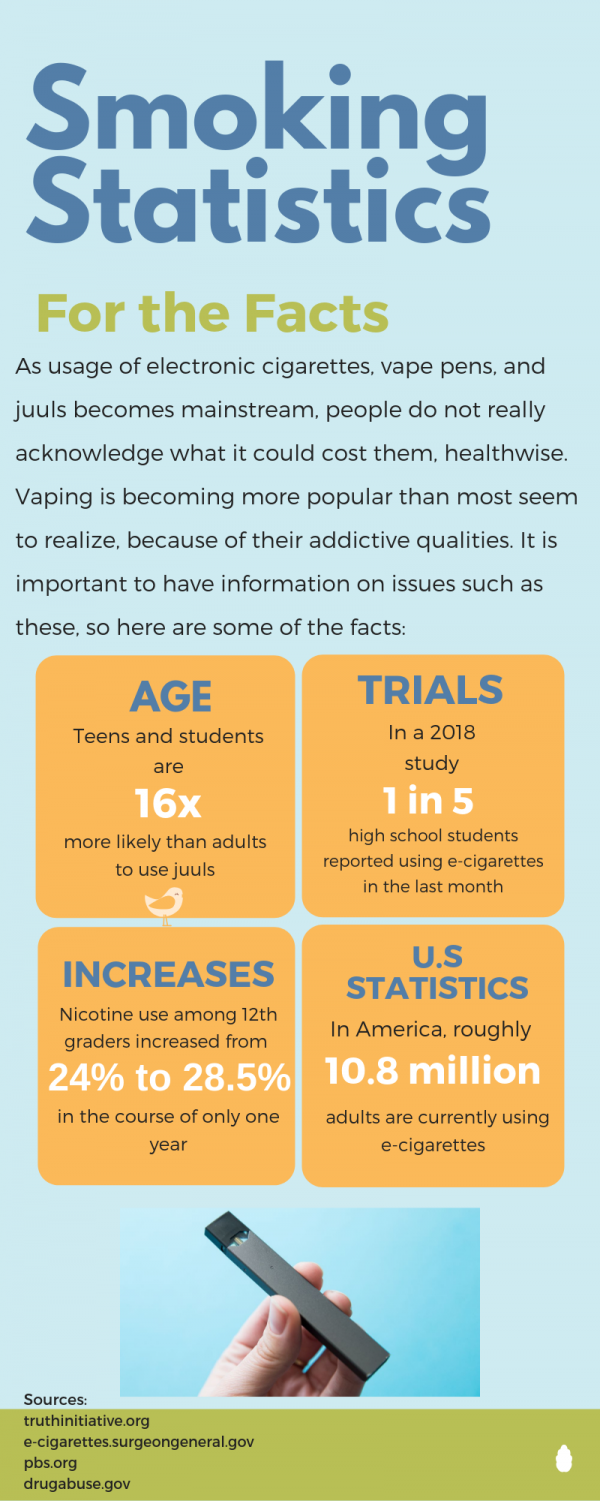First Vaping-Related Death Reveals the Dangers of Electronic Cigarette Use
Juuls have grown to be such a marketable and profitable product that they are now being displayed as a top-seller item in smoke shops.
Aug 27, 2019
In many modern high schools, nicotine consumption is becoming a considerably large issue. In recent years, teens have turned away from plain old cigarettes and are flocking to the newest trend: vaping, the practice of inhaling nicotine through electronic cigarettes, vape pens, and Juuls. With the novelty of these ‘e-cigarettes,’ professionals can not be entirely sure of their effects on long-term respiratory health. However, recent evidence, including that surrounding the first casualty from a vaping related-illness, indicates that newly diagnosed varieties of lung disease may be linked to frequent vaping.
Despite having only been introduced to the market around four years ago, Juuls have already skyrocketed in popularity, especially among the younger generations. In fact, the use of electronic cigarettes proves to create a harmful dilemma in high schools – students will skip class to go to the bathroom and vape rather than focusing on their education. It has become a fast-rising problem in schools all over America, and Coral Gables Senior High is not an exception.
“Products that are confiscated are sent directly to the police lab. If the lab finds any illegal substance in electronic cigarettes, it results in immediate suspension,” Mr. Gonzalez said.
People often mistakenly believe that these electronics are safer than normal cigarettes because they assume they have lower levels of nicotine. However, it has been continuously proven that one Juul pod can contain twice as much nicotine as an electronic cigarette, and twenty times as much as as a single cigarette.
“It’s not an incredibly major issue at Coral Gables Senior High, but it is a big issue,” freshman Alejandro Garnier said.
Additionally, the cartridges installed in most vaping apparatuses contain dangerous chemicals, such as formaldehyde. Ingesting these substances can bring about serious side effects such as nausea, dizziness vomiting, a weakened immune system and irritation of the eyes, throat and lungs.
In the most drastic of situations, these products can permanently alter a developing teenage brain, cause lung cancer, damage the liver and kidneys and even lead to death. Additionally, adolescents can become addicted and be inclined to experiment with smoking real cigarettes or using more harmful drugs.

Pictured above are a variety of statistics regarding the usage of e-cigarettes among teenagers and adults alike, displaying the increasing influence of them in society in addition to their consequences.
“Students should be more cautious of vaping and Juuling in general and start to rethink whether or not they should be doing it in the first place,” sophomore Amanda Galceran said.
Most of these consequences have been revealed in meticulously documented studies over the past several years, but recently, investigators have uncovered more novel, worrisome consequences of using these electronic devices.
The Center for Disease Control is now officially investigating vapes as a result of the one hundred and ninety-three new cases of lung illness that have sprouted up in twenty-two different states, according to a New York Times article.
In these cases, users of nicotine-filled e-cigarette products have fallen extremely ill, with symptoms including shortness of breath, chest pain, vomiting, diarrhea and fatigue. One death was reported on Aug. 23 as a result of this mysterious illness, creating shock waves in the media.
The most severe symptoms of this disease – which also prove to be the most fatal – are difficulty breathing and harm to the lungs. The organ damage is reported to be progressing quickly despite medical efforts, and those affected now require equipment to assist them with their breathing.
Many of the affected individuals are teens and adults ranging between the ages of 17 and 38.
Doctors are rushing to diagnose and treat the disease to avoid more casualties, but with little research on vaping’s long-term effects, their most critical advice remains: do your lungs a favor and avoid vaping or smoking altogether.
Despite the warnings of medical professionals as well as the “over 21” age limit for consuming nicotine products, teens are still getting their hands on e-cigarettes and using them at alarming rates – one in five American high schoolers have vaped at least once in their lives.
Some schools have tried to end this problem by banning flash drives, which look similar to Juuls, but this is a difficult rule to enforce as they are so small and easy to hide. Others have suggested smoke detectors, but these devices produce vapor rather than smoke, and therefore could not trigger the alarm of a traditional smoke detector.
This controversial question upholding a profound degree of significance among today’s younger generations is still up in the air as parents, teachers and other administrators try to come up with a successful fix, and the diligent efforts to resolve the situation quickly in hopes of preventing the discovery of long-term health consequences from taking effect cannot be underscored.













Beatriz • Aug 26, 2019 at 11:00 pm
Excellent article, I will share with a couple of friends that have teenager kids, so they can be aware of the danger of electronic cigarettes.